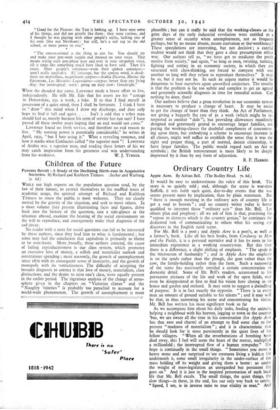Children of the Future
WHILE our high experts on the population question tend, by the law of their nature, to restrict themselves to the muffled tones of academic usage, the spirited -attempt of Richard and Kathleen Titmuss to rouse the public is most welcome. They are clearly moved by the gravity of -the situation, and seek to move others. In a short volume they present illuminating facts and figures, delve back into the history of the question cast a side-glance at the situation abroad, examine the bearing of the social environment on the will to reproduce, and courageously make their diagnosis of the sad decay.
No reader with a taste for social questions can fail to be interested by these authors, since they lead him to what is fundamental ; but some may feel the conclusion that capitalism is primarily to blame to be over-hasty. More .broadly, these authors contend, the cause of failing reproductiveness is our class system, which promotes an excessive love of money, a selfish and materialist outlook and ostentatious spending ; more narrowly, the growth of unemployment since 1870 with its consequent sense of insecurity, and the growth of monopoly with its restrictiveness. The difficulty of accepting the broader diagnosis as correct is that love of money, materialism, class distinctions, and the desire to raise one's class were equally present in the earlier period. The ingenious analysis Of the change of atmo- sphere givcn in the chapters on "Victorian climax" and the "Naughty 'nineties" is probably too parochial to account for a world-wide phenomenon. The growth of unemployment is more plausible ; but can it really be said that the working-classes in the grim days of the early industrial revolution were entitled to a greater sense of security when unemployment, not so frequent perhaps, but by no means absent, meant starvation or they workhouse? These speculations are interesting, but •not decisive ; a careful student would not think that they gave a clear presumption either way. Our authors tell us, "we have got to eradicate the profit motive from society," and again, "so long as men, twisting, turning, fighting and rotting in an economic society, in which they are saturated with class-thinking, are forced to compete with one another so long will they refuse to reproduce themselves." It may be so, but it may not be. In such an urgent matter it would be dangerous to base ourselves upon unverified conjecture. The trouble is that the problem is far too subtle and complex to get an agreed and genuinely scientific diagnosis in time for remedial action. Can nothing be done, then?
Our authors believe that a great revolution in our economic system is necessary to produce a change of heart. It may be easier to get the change of heart than they think. An Act of Parliament, not giving a beggarly flat rate of 5s. a week (which might be in- terpreted as another "dole "), but providing allowances manifestly designed and generously geared to encourage larger families, not paying the working-classes the doubtful compliment of concentrat- ing upon them, but embodying a scheme to encourage increase in all classes, might well suffice to establish the sense that it was the right and proper thing, a part of normal, decent citizenship, to have larger families. The public would regard such an Act as symbolic ; the British temperament is more likely to be deeply impressed by it than by any form of adjuration.
R. F. HARROD.


























 Previous page
Previous page